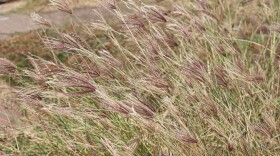The Kauaʻi-based National Tropical Botanical Garden has been involved in restoration efforts across the Hawaiian Islands.
HPR learned about its treasured native loulu palm collection and the efforts underway to battle the dreaded coconut rhinoceros beetle. The insect prefers coconut palms but will look to other species as well.
The garden's prized loulu palms are being closely monitored as the beetles were discovered on Kauaʻi last year.
Seana Walsh, a conservation scientist and curator of NTBG's living collections, said they have the largest collection of the genus Pritchardia. She said the genus used to be a more dominant plant across the Hawaiian Islands, but the introduction of rats probably led to a decline.
"As far as with the threats I mentioned that have been here for a long time, and now with CRB, not only are our collections in danger, but also those plants remaining in the wild," she said.
Leslie Matsumoto, the foreman at the McBryde Garden, is hands-on out in the garden, checking the nettings, traps and metal barriers around the palm fruit.
She said they wrap the most sensitive parts where coconut rhinoceros beetles can burrow in and then suck out all of the juices from the meristem of the tree, essentially leading to the loulu's death.
However, the hands-on operation is only applicable for the shorter loulus. Matsumoto said the taller ones are preventatively treated with systemic insecticides. The defense against these dreaded pests involves quite a bit of trial and error.
"We also have on the table drone contact spraying, which we have not done yet, but we're looking to do in the near future," Matsumoto said.
Tobias Koehler, the director of South Shore Gardens (McBryde and Allerton), said about 45,000 people visit this particular site. Koehler couldn't stress enough the sense of urgency to protect these palms not just for the future but for culture’s sake.
"When we envision educating a world about what happens in Hawaiʻi and the Hawaiian culture, loulu palms and many other native plants have stories and are then integrated into function as well as other cultural uses. And if something like this goes away, it's just, it's a missing piece of a puzzle, and so you just get less and less of a complete picture of how things should be," he said. "We're here to ring the bell and say we have this resource here that is irreplaceable."
Just last week, the state Agriculture Department put out a request for proposals to help in the battle of the beetle across the state. The National Tropical Botanical Garden will look to see if it's something it can apply for.
This interview aired on The Conversation on Nov. 15, 2024. The Conversation airs weekdays at 11 a.m. on HPR-1.









